A Brighter Summer Day (Edward Yang, 1991)
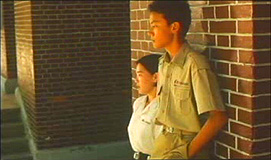 The title of Taiwanese director Edward Yang’s massive
nationalist epic A Brighter Summer Day is lifted from a lyric to the
Elvis Presley song “Are You Lonesome Tonight?”, but near the end of the
film, we find that The King, who was idolized in Taiwan, describes the country
as a “little unknown island.” That Yang doesn’t see fit to have anyone
argue with that depiction of his homeland seems indicative of the country’s
self-image, or general lack of one, circa 1961, the year in which he sets most
of the movie. By that time, the shock of the 1948 immigration of defeated
Nationalist Chinese to Taiwan was fading into memory, and the country seemed to
be struggling with defining its identity under Chiang Kai-shek’s rule. Even
as, or perhaps especially as, citizens of a new country born out of a failed
civil upheaval, the uprooted Taiwanese people in 1961 seemed to have a lot of
civic pride (they’re shown standing at full attention during their national
anthem), but twelve years after their arrival, Yang shows that in them there is
uncertainty about their future and political present.
The title of Taiwanese director Edward Yang’s massive
nationalist epic A Brighter Summer Day is lifted from a lyric to the
Elvis Presley song “Are You Lonesome Tonight?”, but near the end of the
film, we find that The King, who was idolized in Taiwan, describes the country
as a “little unknown island.” That Yang doesn’t see fit to have anyone
argue with that depiction of his homeland seems indicative of the country’s
self-image, or general lack of one, circa 1961, the year in which he sets most
of the movie. By that time, the shock of the 1948 immigration of defeated
Nationalist Chinese to Taiwan was fading into memory, and the country seemed to
be struggling with defining its identity under Chiang Kai-shek’s rule. Even
as, or perhaps especially as, citizens of a new country born out of a failed
civil upheaval, the uprooted Taiwanese people in 1961 seemed to have a lot of
civic pride (they’re shown standing at full attention during their national
anthem), but twelve years after their arrival, Yang shows that in them there is
uncertainty about their future and political present.
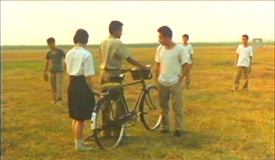 As fully conceived as any political film I can recall
outside of Bela Tarr’s Satantango, Brighter
unfurls over a four-hour period, but almost none of it seems extraneous. Yang
masterfully creates an environment in which young gangsters seem more in control
of things than the sprawling bureaucratic government. Despite appearances,
however, that semblance of control is just an illusion created by the Yang’s
closeness to his subjects. Whenever the characters in the film step too far out
of line, authority figures swoop in with shocking, almost mechanical, efficiency
to set things right. The tenuous state of affairs in the country is balanced
between Communist and Democratic concerns, and throughout the movie, reminders
of that inherent ideological conflict crop up. Perhaps nowhere is this more
gracefully conveyed than in the scene where a student points out that the
Chinese character for the word “I” takes much longer to write than its
English counterpart, much to the irritation of his patriotic teacher. Yang seems
to be pointing out here that since it’s quite literally more difficult to
conceptualize the concept of oneself in the language that the Taiwanese people
use, growing pains are to be expected when shifting to a government that puts
power in the hands of the individual.
As fully conceived as any political film I can recall
outside of Bela Tarr’s Satantango, Brighter
unfurls over a four-hour period, but almost none of it seems extraneous. Yang
masterfully creates an environment in which young gangsters seem more in control
of things than the sprawling bureaucratic government. Despite appearances,
however, that semblance of control is just an illusion created by the Yang’s
closeness to his subjects. Whenever the characters in the film step too far out
of line, authority figures swoop in with shocking, almost mechanical, efficiency
to set things right. The tenuous state of affairs in the country is balanced
between Communist and Democratic concerns, and throughout the movie, reminders
of that inherent ideological conflict crop up. Perhaps nowhere is this more
gracefully conveyed than in the scene where a student points out that the
Chinese character for the word “I” takes much longer to write than its
English counterpart, much to the irritation of his patriotic teacher. Yang seems
to be pointing out here that since it’s quite literally more difficult to
conceptualize the concept of oneself in the language that the Taiwanese people
use, growing pains are to be expected when shifting to a government that puts
power in the hands of the individual.
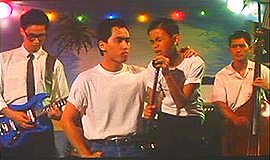 The freedoms afforded to the people as a result of their
defection from the Mainland are apparent, but each one seems to come with a
pitfall. Cultural artifacts from other nations, some left behind from the
Japanese occupation that means next to nothing to the 1948 immigrants, can be
spotted everywhere, though they lead to identity confusion for the foundling
culture, filling gaps that the developing nation hasn’t yet had an opportunity
to fill itself. There is a new a possibility of finding work in the private
sector, though capitalism brings with its freedoms more opportunities for
corruption, typified by the gangs that film focuses on. One can air a grievance
with the bureaucracy without immediate fear of recrimination, though the results
of doing such a thing are questionable since government still has the power to
act without explanation. It’s this lack of total success in the conversion to
the new order that creates the aura of uncertainty that dominates the film.
The freedoms afforded to the people as a result of their
defection from the Mainland are apparent, but each one seems to come with a
pitfall. Cultural artifacts from other nations, some left behind from the
Japanese occupation that means next to nothing to the 1948 immigrants, can be
spotted everywhere, though they lead to identity confusion for the foundling
culture, filling gaps that the developing nation hasn’t yet had an opportunity
to fill itself. There is a new a possibility of finding work in the private
sector, though capitalism brings with its freedoms more opportunities for
corruption, typified by the gangs that film focuses on. One can air a grievance
with the bureaucracy without immediate fear of recrimination, though the results
of doing such a thing are questionable since government still has the power to
act without explanation. It’s this lack of total success in the conversion to
the new order that creates the aura of uncertainty that dominates the film.
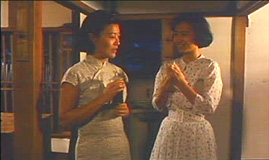 By examining the effects that such an environment has on a
vast cast of characters, and specifically the family of a 14-year-old boy named
S’ir, Yang personalizes the politics without sacrificing an examination of the
complexities and contradictions inherent in any political discourse. His cast is
filled with plenty of variables, but each character’s plight seems equally
worrisome. S’ir’s father, for example, is a civil servant who takes great
pride in his high-ranking job and the accomplishments of his daughter, who
attends the best government-sponsored college. Whenever one of his sons
disappoints him, however, he butts his head against the bureaucracy, in hopes of
getting personal favors from a system that reminds him of its has “fair”,
firm, and universal regulations. The disconnect between the way that the people
and the government operate is made apparent, but as soon as it seems that Yang
might be simplifying things, he tosses another individualized metaphor into the
stew, adding to the generally confused state of things. S’ir’s shifting
morality forms the backbone of the movie’s narrative structure, but when a
truly heartbreaking tragedy befalls him, the entire nation is moved by it,
because the strains weighing down on him and his family seem to be epidemic in
the country at that time.
By examining the effects that such an environment has on a
vast cast of characters, and specifically the family of a 14-year-old boy named
S’ir, Yang personalizes the politics without sacrificing an examination of the
complexities and contradictions inherent in any political discourse. His cast is
filled with plenty of variables, but each character’s plight seems equally
worrisome. S’ir’s father, for example, is a civil servant who takes great
pride in his high-ranking job and the accomplishments of his daughter, who
attends the best government-sponsored college. Whenever one of his sons
disappoints him, however, he butts his head against the bureaucracy, in hopes of
getting personal favors from a system that reminds him of its has “fair”,
firm, and universal regulations. The disconnect between the way that the people
and the government operate is made apparent, but as soon as it seems that Yang
might be simplifying things, he tosses another individualized metaphor into the
stew, adding to the generally confused state of things. S’ir’s shifting
morality forms the backbone of the movie’s narrative structure, but when a
truly heartbreaking tragedy befalls him, the entire nation is moved by it,
because the strains weighing down on him and his family seem to be epidemic in
the country at that time.
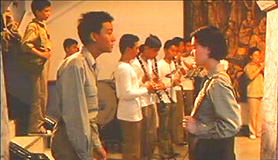 The film’s style creates something of a paradox. Using
very few close-ups, Yang remains far enough from his subjects that the audience
can judge them objectively, but he never moves so far away from them that the
audience loses its grasp on their concerns. Without using the cinematic language
that would normally prompt the viewer to identify with his protagonists, the
familiarity that arises from the running time and consistent political attitudes
evident in the script focuses audience concern where Yang wants it. To find so
much order in so much narrative, political and emotional chaos is Yang’s grand
accomplishment here. Even though he’s trudging through messy autobiographical
territory, never for a moment does the expansive scope of the film’s themes
seem to intimidate the director. The film is laced with nostalgia, but never at
the expense of intelligence. He deftly creates a manifesto here that sums up
his volatile, often conflicting, attitudes about his country’s modern history.
Watching the film, with its seemingly limitless ability to examine the country,
one laments the fact that every developing nation doesn’t have a storyteller
as gifted as Yang probing the history of its progress. As it is, A
Brighter Summer Day stands as a massive achievement, perhaps the greatest in
all of modern Taiwanese cinema.
The film’s style creates something of a paradox. Using
very few close-ups, Yang remains far enough from his subjects that the audience
can judge them objectively, but he never moves so far away from them that the
audience loses its grasp on their concerns. Without using the cinematic language
that would normally prompt the viewer to identify with his protagonists, the
familiarity that arises from the running time and consistent political attitudes
evident in the script focuses audience concern where Yang wants it. To find so
much order in so much narrative, political and emotional chaos is Yang’s grand
accomplishment here. Even though he’s trudging through messy autobiographical
territory, never for a moment does the expansive scope of the film’s themes
seem to intimidate the director. The film is laced with nostalgia, but never at
the expense of intelligence. He deftly creates a manifesto here that sums up
his volatile, often conflicting, attitudes about his country’s modern history.
Watching the film, with its seemingly limitless ability to examine the country,
one laments the fact that every developing nation doesn’t have a storyteller
as gifted as Yang probing the history of its progress. As it is, A
Brighter Summer Day stands as a massive achievement, perhaps the greatest in
all of modern Taiwanese cinema.
* * * * Masterpiece
11-25-02
Jeremy Heilman